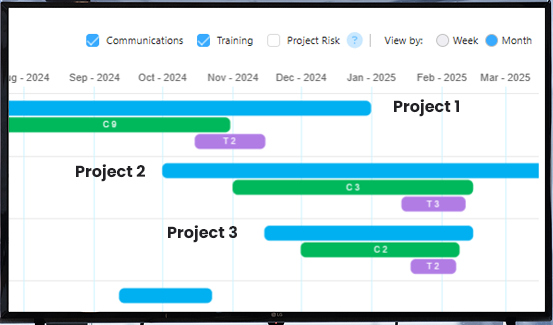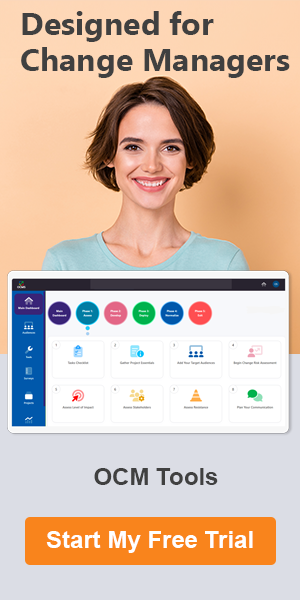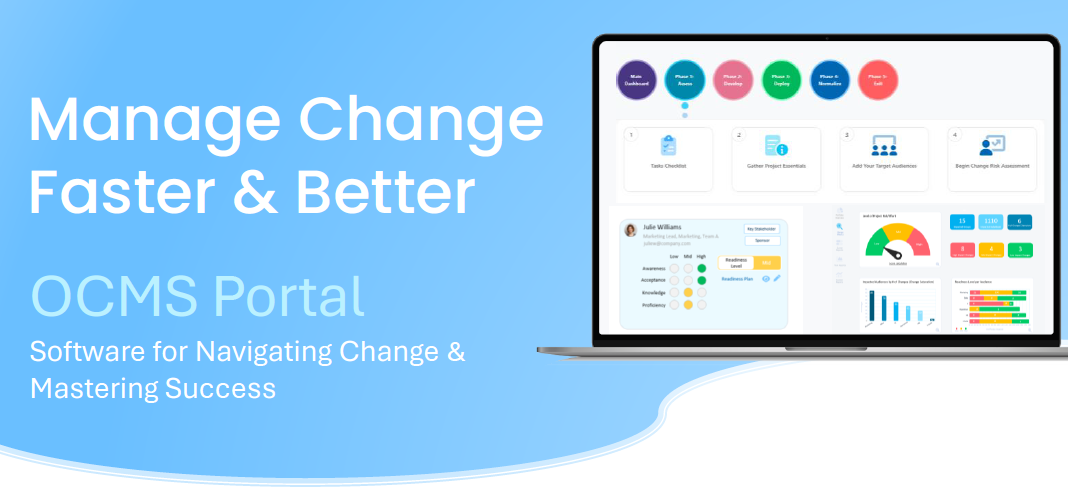How Are Change Management Best Practices Evolving in the Future?
Change management has long been a key factor in the success of organizations, but with the rapid pace of business transformation in recent years, it’s become even more critical. As we approach 2025, new trends in change management are emerging, driven by digital transformation, evolving workforce expectations, and the growing importance of sustainability in organizational strategies.
Change managers and organizational leaders must stay ahead of these new trends in organizational change management to be successful and continue to thrive in an ever-evolving landscape.

So, what new change management trends are on the horizon that you should know about? We’ll explore the most important change management trends for 2025 and discuss how you can leverage them to guide your organization through successful evolution in the coming years
Key Takeaways
|
1. Digital Transformation and Technology-Driven Change
Digital transformation continues to redefine the business world, with technology playing a central role in organizational change and transformation. New technologies like generative AI and machine learning are reshaping industries, forcing organizations to adapt rapidly. The future of business change and transformation will be heavily influenced by digital tools like Copilot, ChatGPT, and Gemini, designed to streamline operations, enhance customer experiences, and optimize productivity.
In the coming year, change management best practices will need to incorporate technological agility, focusing on training employees to adapt to new systems and ensuring that organizations can pivot quickly in response to technological disruptions. Leaders will need to integrate technology with good change management practices to ensure employees are well-supported during tech-driven changes, rather than just expecting them to adopt a new tool or AI-driven feature on their own.
Key Tip: When managing technology-driven change, it’s essential to balance the human element. Continuous communication and skill development are vital for helping teams transition to tech-centric roles. Incorporating digital adoption platforms and AI-based learning tools can make this process smoother.
Do you have any questions or feedback about best practices in organizational change or current trends in change management? Please reach out and let us know.
2. Increased Focus on Employee Experience and Well-Being
One of the most critical emerging trends in change management is the growing emphasis on employee well-being. As the future workforce becomes more diverse and expects greater work-life balance, organizations must prioritize the human element of business transformation and change management. Employee experience is no longer just an HR function—it is integral to organizational success.
As we move forward, change management transformation will emphasize empathy, resilience, and support for employees during times of transition. This shift reflects an understanding that managing stress, mental health, and workload are key factors in preventing burnout and ensuring that employees embrace change rather than resist it.
Key Tip: Create personalized change management plans that address the unique needs of different employee groups. Leverage tools like pulse surveys and one-on-one meetings to gather feedback and adjust strategies to improve employee well-being during times of change.
3. Sustainability and Corporate Social Responsibility (CSR) as Drivers of Change
With the increasing focus on environmental, social, and governance (ESG) factors, sustainability will be a significant driver of organisational transformation and change management in 2025. Companies are recognizing the need to align their operational strategies with sustainable business practices, which includes managing transformational organizational change to reduce environmental impact and enhance social responsibility.
This trend will demand that change management practitioners integrate sustainability goals into the broader scope of managing change and transformation. This means not only implementing sustainable practices but also ensuring that these changes are communicated effectively throughout the organization and that employees understand their role in contributing to long-term environmental and social goals.
Key Tip: Use storytelling and data-driven communication to highlight the impact of sustainability initiatives. Engage employees by showing them the tangible outcomes of their efforts, fostering a sense of pride and ownership in driving change toward sustainability.
4. Agile Change Management
Agility is no longer just a project management methodology—it has become a key trend in managing change and transformation. In today’s fast-paced business world, traditional linear change management approaches may no longer be sufficient. Instead, organizations must embrace agile change management techniques that allow for iterative, flexible, and responsive strategies.
Agile change management focuses on small, continuous changes rather than massive overhauls as good change management practices. It promotes adaptability by enabling organizations to test, learn, and adjust in real time, ensuring that change efforts remain aligned with business needs and external factors.
Key Tip: Implement a culture of continuous feedback within your organization. Regularly assess the impact of changes, gather feedback from employees, and make quick adjustments as needed. An agile approach to transformation and change management will help keep your organization flexible and resilient in the face of uncertainty.
Please let us know if you have any feedback from your own experience with organizational change and transformation, best practices for implementing change, or navigating new trends in organisational change.
5. Culture as a Core Component of Transformation
Organizational culture will play a central role in the future of change management. As organizations continue to adapt to new market conditions, the alignment between company culture and change initiatives will be more important than ever. A strong, adaptable culture is crucial for driving successful transformations, particularly during periods of uncertainty and disruption.
In the coming year, change leaders will focus on fostering a culture of innovation, learning, and inclusivity.
Employees need to feel empowered to embrace change and understand how their personal contributions align with broader organizational goals.
Key Tip: Align cultural values with change initiatives from the start. Engage employees at all levels in defining the cultural aspects that will support the change and use cultural ambassadors to promote positive behaviors and mindsets that are aligned with organizational goals.
6. The Rise of Data-Driven Change Management
As data continues to drive decision-making across industries, change management and business transformation will increasingly rely on change analytics and metrics to ensure the success of change initiatives. Data-driven change management trends allow organizations to track progress, measure employee engagement, and analyze the effectiveness of change strategies in real time.
In the near change management future, predictive analytics and AI will play a key role in identifying potential resistance points and forecasting the impact of change initiatives before they are implemented. Organizations that leverage data to inform their change management strategies will be better positioned to make informed decisions and quickly address issues before they escalate.
Key Tip: Utilize digital tools, like OCMS Portal, that track key performance indicators (KPIs) such as employee engagement, productivity, and change adoption rates. These insights will allow you to make data-driven adjustments to your change strategy in real time, ensuring that your transformation efforts stay on track and are following change management best practices.
Do you have any questions about emerging trends in organizational change management and how they’re impacting good change management practices? Please reach out and let us know!
7. Cross-Functional Collaboration and Leadership
One of the current trends in change management is the increasing importance of cross-functional collaboration. In today’s complex and fast-changing business environment, change initiatives often span multiple departments, requiring seamless collaboration between different teams and functions.
Organizational change management best practices will increasingly depend on strong leadership and the ability to foster collaboration across various silos. Change managers will need to work closely with IT, HR, operations, and other key departments to ensure that change efforts are well-coordinated and aligned with organizational change and transformation goals.
Key Tip: Establish cross-functional change management teams with representatives from key departments to foster collaboration. As part of your best practices in organizational change, these teams should meet regularly to ensure alignment and address potential challenges early on.
8. Diversity, Equity, and Inclusion (DEI) as a Pillar of Change
Inclusion and equity have become fundamental to change management principles and best practices, and this trend will only continue to grow in importance in the coming years. Organizations are recognizing that inclusive change management process best practices that actively engage diverse voices lead to more successful and equitable outcomes.
Incorporating diversity, equity, and inclusion (DEI) into your change management transformation strategy means involving a wide range of stakeholders in the planning and execution stages, ensuring that underrepresented groups are not left out of the conversation. DEI-driven change management fosters a more collaborative and innovative environment and reduces the risk of resistance from marginalized groups.
Key Tip: Ensure that your change management process includes mechanisms for input from diverse employees and stakeholders. Consider forming DEI-focused advisory boards to provide insights into how change initiatives may impact different groups within the organization.
Have you seen any emerging trends in change management impacting transformational organizational change that you think we should add here? Please let us know.
9. Managing Change Saturation (Change Fatigue)
Organizational change trends show that organizations are going through more change than ever before. As employees deal with multiple simultaneous changes, the risk of change saturation and resistance increases. Change saturation (also known as change fatigue) occurs when employees feel overwhelmed by the volume of changes happening at once, leading to burnout and decreased productivity.
In the coming year, best practices for implementing change will place a greater emphasis on managing change saturation and preventing employee fatigue. This will require a more thoughtful approach to timing, prioritizing changes, and ensuring that employees are not overloaded with too many initiatives at once.
Key Tip: As part of good change management practices, assess your organization’s capacity for change regularly and implement change at a pace that employees can manage. Use feedback tools to monitor employee well-being, and change management software that provides saturation visibility across projects. Adjust your strategy to prevent overload.
OCMS Portal – Change Management Software with Full Change Saturation Visibility

10. Concise Communication: Addressing Shortening Attention Spans
Another of the new trends in organisational change is shorter attention spans, which impacts communications. As attention spans continue to shrink in today’s fast-paced world, concise communication has become a critical principle for transformation and change management. With the influx of digital distractions and information overload, employees and stakeholders have less patience for lengthy, convoluted messages. Change leaders need to adopt a streamlined communication style that conveys essential information quickly and clearly as part of their change management best practices.
Incorporating this trend into your transformational organizational change process means being direct and to the point, whether you’re delivering an email, a presentation, or an all-hands meeting. Leaders should avoid jargon, use bullet points, and focus on the key takeaways that employees need to understand and act on. By adopting this communication style, you’ll minimize confusion, prevent overwhelm, and improve overall engagement with the change initiative.
Key Tip: Change management future trends include the common use of visual aids like infographics, charts, and brief videos to convey complex information more efficiently. These tools not only make information easier to digest but also help break through the noise and capture attention in a way that traditional, text-heavy formats may not.
Please let us know if you still have questions about the future of change management, any of these current trends in change management, or business transformation and change management best practices.
Conclusion: Preparing for Future Trends in Change Management
As we approach the new year, change management practitioners and organizational leaders must stay ahead of these current change management trends to navigate the complexities of business transformation. By embracing agile change management, focusing on employee well-being, leveraging data-driven insights, and fostering a strong organizational culture, you can ensure your organization is ready to thrive in a rapidly changing world.
The future of change management is about more than just managing transitions—it’s about creating a resilient, adaptable organization that can weather disruptions and seize new opportunities. Keep these trends and change management best practices for managing change and transformation in mind as you plan for the road ahead, and your organization will be well-positioned for success in 2025 and beyond.
Future-ready Software to Support Modern Change Management Transformation
Are you still using outdated tools for business transformation and change management? Spreadsheets and apps designed for tracking tasks are not going to help you keep up with these new trends in change management.
For easier and more efficient management of business change and transformation across enterprises, you need OCMS Portal. This all-in-one change management software meets the needs of change management trends for 2025 and beyond. With automation, change saturation reporting across the organization, and much more!
FAQ: New Trends in Organizational Change Management
What are the top five new trends in change management?
Several new trends in organisational change management are quickly becoming standard good change management practices. The top five change management future trends include:
- Digital Transformation and Technology-Driven Change
- Increased Focus on Employee Experience and Well-Being
- Culture as a Core Component of Transformation
- The Rise of Data-Driven Change Management
- Managing Change Saturation (Change Fatigue)
What are some new organizational change management best practices based on emerging change management trends?
Organizational change management best practices are swiftly being updated to adapt to emerging trends in change management. Some of the newer change management principles and best practices include:
- Adapting to shorter attention spans by using a streamlined communication style that conveys essential information quickly and clearly.
- Establishing cross-functional change management teams with representatives from key departments to foster collaboration.
- Moving from spreadsheets to modern change management software for efficiency, automation, and visibility into impacts and saturation across the enterprise.
What’s the best software for managing change management transformation and organizational change trends?
OCMS Portal is a leading software for managing change and transformation, and is used by Fortune 100 and 500 companies. It guides users through good change management practices and has the tools needed to keep up with organisational transformation and change management trends.
You can try it out for free to see the change management process best practices for yourself. Sign up for a free trial here: https://portal.ocmsolution.com/free-trial-checkout
Note: Content on OCM Solution's ocmsolution.com website is protected by copyright. Should you have any questions or comments regarding this OCM Solutions page, please reach out to Ogbe Airiodion (Change Management Lead) or the OCM Solutions Team today.
External Sources: stock.adobe.com






